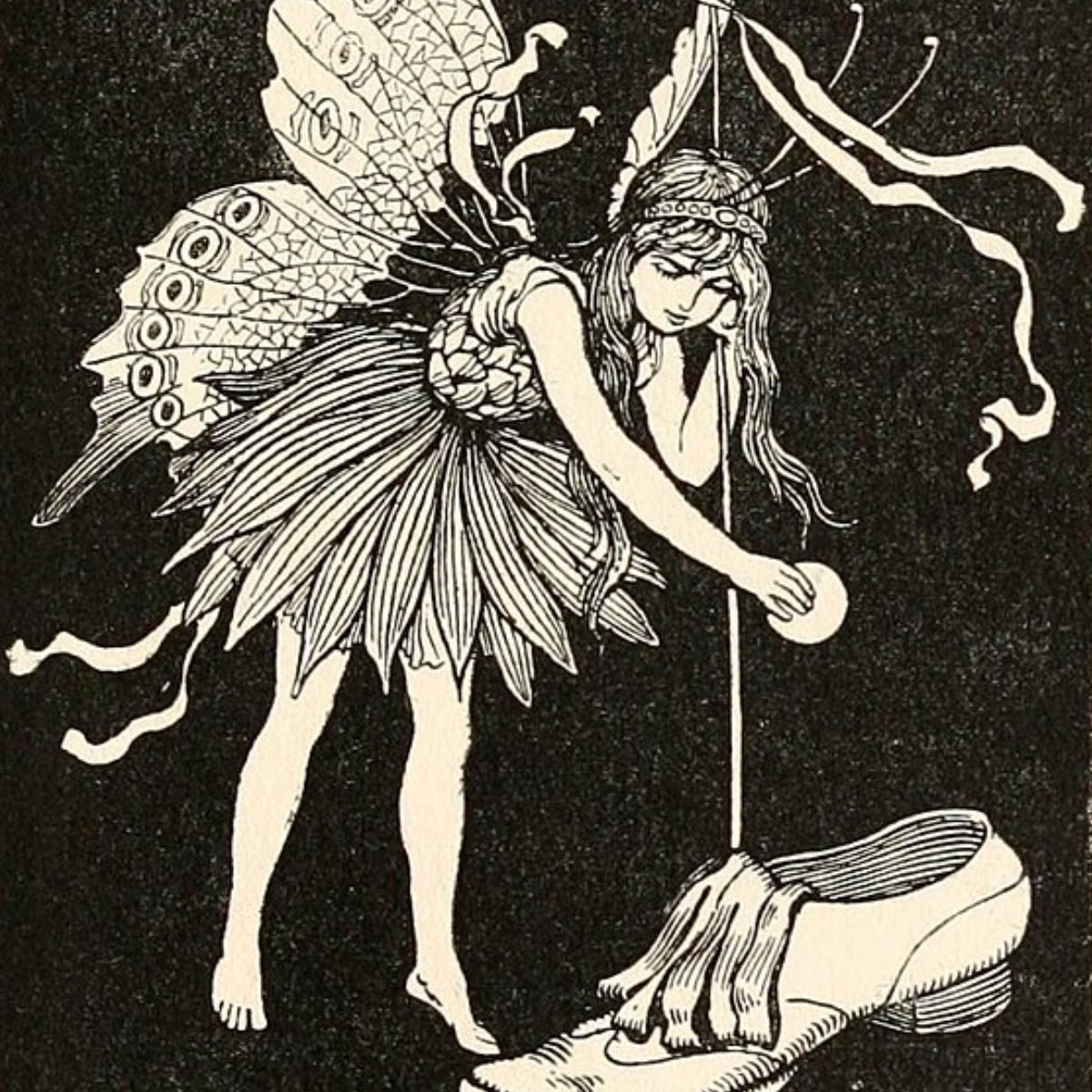In researching faerie folklore for my creative writing, I have discovered that faerie morality was quite complex. Not only did faeries follow their own belief system, they also expected the humans they interacted with to follow it as well. Faerie-approved behavior was often rewarded, but mortals needed to take care not to upset the faeries, or they might suffer some type of punishment.
Grateful Faeries
Faeries were often grateful when humans showed kindness to them. This could take the form of a one-time gift or in ongoing prosperity. In Celtic Folklore: Welsh and Manx, John Rhŷs gives an example of a single gift granted by the faeries in response to human kindness. He interviewed a Mr. Hughes, who told him of a tradition in which people in the area of Wales where he lived would “… heat water and leave it in a vessel on the hearth overnight for the fairies to wash their children in it.” The faeries, thankful to be shown this kindness, “… left behind them on the hearth a handful of their money.”
In a similar fashion, ongoing prosperity might be granted to a human by the faeries in response to a kindness shown them. Katharine Briggs describes a common story which revolves around a broken faerie tool in An Encyclopedia of Fairies. She explains that the theme of this story type tends to be consistent:
… a FAIRY or PIXY is heard [overheard] by a kindly ploughman lamenting a broken stool, shovel or kirn-staff [the handle of the plunger of a butter churn]. He [the ploughman] mends it and is given a delicious little cake as a reward. … he eats it, and is prosperous ever after.
In this case, the ploughman earns both types of rewards from the faerie: he first receives the one-time gift of cake, then upon consuming it, he is again rewarded with continued prosperity. (Side note: eating faerie food is sometimes considered dangerous in faerie folklore, but in this case Briggs explains that “… in the stories of this type … no ill-consequences come of eating FAIRY FOOD outside Fairyland.” It is simply part of the reward.)
Faerie gratitude was not limited to mortals who showed them kindness. Other human behaviors that might garner faerie rewards included displaying good manners, keeping a tidy house, and maintaining a clean hearth.
Faerie Punishments
While the faeries were quick to show their thanks for behavior which they valued, they also did not hesitate to dole out punishments to humans who behaved in ways they disapproved of. Brian Froud and Alan Lee explain this in their gorgeously illustrated Faeries:
The lazy or dishonest will be punished with pinching, cramps or even lameness and worse. The kitchen maid who omits to sweep out the hearth and set out clean water for the faerie babies to bathe in does so at her risk while her conscientious attention to these details could well bring her a gift of money in her shoe when she wakes and much good luck …

Upsetting a faerie was a risky undertaking—not only could you lose out on receiving a possible faerie reward, you might also suffer physically. Additionally, as the faeries were a secret bunch, they had no tolerance for humans spying on them or infringing on their privacy. Boasting of having received a faerie gift or spying on faeries could result in a punishment of illness or pinching. But woe to those who thought to steal a faerie treasure: that act might endanger their lives.
There are also instances of faeries giving consequences for behaving poorly. Returning to Celtic Folklore: Welsh and Manx, Rhŷs relates another story told to him by the same Mr. Hughes mentioned above. It is a story of a husband who is witnessed mistreating his wife by the faeries. Rhŷs translates Mr. Hughes’ tale in this manner:
The husband had been behaving as he ought, until one day, as he held the plough, with the wife guiding his team, he broke his covenant towards her by treating her harshly and unkindly. No sooner had he done so, than he was snatched through the air and plunged in the lake. When the wife went to the brink of the water to ask for him back, the reply she had was, that he was there, and that there he should be.
Mr. Hughes heads off into a different story at this point, and we do not learn whether or not the husband began treating his wife with more respect as a result of faeries’ reprimand. Perhaps the tale was meant to serve more as a warning to treat your family with kindness.
Faeries Followed Their Own Rules
Yet for all of the rules of good behavior the faeries wished humans to abide by, they did not always hold themselves to the same standards. In Faeries, Froud and Lee explain that “… a faerie will have no qualms at appropriating victuals, goods and livestock from mortals.” This also includes the faerie practice of stealing of human babies. (For more on this topic, see my post on changelings.)
The Interplay Between Faerie Morality and Humans’ Moral Codes
As I researched to prepare for this post, I noticed interesting observations by folklorists with respect to humans responding to the belief in the faeries’ moral code. Wirt Sikes suggests in his book, British Goblins: Welsh Folk-lore, Fairy Mythology, Legends and Traditions, that the possibility of earning faerie rewards for good behavior reinforced the “virtue of perseverance” with respect to maintaining a neat and clean home, which in turn kept the human inhabitants safe (i.e. keeping the hearth swept and maintaining full buckets of water). He also surmises that the “virtues of hospitality and generosity” were reinforced in the same way.
John Rhŷs, in Celtic Folklore: Welsh and Manx, also observes a similar influence that belief in faerie morality had on housekeeping, hospitality, and generosity. He describes a tradition of leaving out water by the foot of the stairs and laying bread and a clean tablecloth on the table at night. That way, should the faeries chance to visit, they might leave a monetary reward for a clean house. He then describes the positive effect this would have on the human household:
Thus, whether the fairies came or not to pay a visit to them during their sleep, the house would be clean by the morning, and the table ready set for breakfast.
Yet while it seems there were positive aspects to believing in faerie morality, Sikes also notes that people may have used the belief in faerie rewards to their benefit. In British Goblins: Welsh Folk-lore, Fairy Mythology, Legends and Traditions, he writes, “The thought will naturally occur that by fostering belief in such tales …, roguery might make the superstition useful in silencing inquiry as to ill-gotten gains.”
Similarly, in An Encyclopedia of Fairies, Briggs relates a tale about a troop of faeries who thresh corn for a farmer without being asked. The farmer leaves them a meal of cheese and bread as thanks. This continues daily until all of the farmer’s corn is threshed. But then something unusual happens—the faeries continue to thresh corn for the farmer, but they are thought to be fetching it from other farms. Briggs writes:
The farmer might well have felt himself to be in a dilemma: on the one hand he was guilty of enriching himself by another’s loss, on the other, he could not risk offending a benevolent but touchy set of patrons; but there is no evidence in the story that the farmer felt any uneasiness at all.
I find this circular situation intriguing—that the faeries’ moral code and the moral belief system of the people of the time period influenced each other and perhaps even reinforced one another. It’s kind of like the chicken and the egg conundrum.
Art credit (featured image): illustration by Warwick Goble via Wikimedia Commons, public domain




